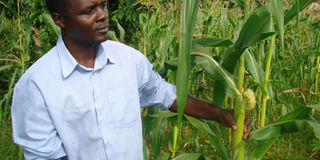Prime
Africa told to diversify diet for food shortage mitigation

Maize is the most consumed food item on the African continent. Uganda in the past year consumed 1.2 tonnes of maize much of which was bought by United Nations for relief in other parts of the region.
African countries should diversify their diet to combat food shortage resulting from climate change, advises a United Nations official, even as the states search for sustainable solutions.
The United Nations Development Programme representative in Kenya Aeneas Chuma said the continent’s heavy reliance on maize as the main staple food could affect its adaptation to climate change.
“Foods such as sorghum, millet and cassava which are indigenous to Africa could help reduce the effects climate because they are more suited to the continent climatic conditions,” Mr Chuma said during the Africa Climate Change Workshop in Nairobi, Wednesday.
He said a more varied diet will help reduce pressure on maize as the main source of nutrition.
“Maize is too expensive to grow it requires a lot of rainfall and fertilizers in order to reach maturity stage,” he said.
He said the staple crop is not indigenous to the continent yet is the most consumed food item adding that many parts of Africa lack adequate rainfall to support maize growing and the situation is compounded by the low uptake of irrigation.
Uganda, for instance, consumed 1.2 tonnes of maize last year, much of which was bought by the United Nation’s World Food Programme (WFP) for relief operations in South Sudan and eastern Democratic Republic of Congo due to changes in weather patterns.
And with unfavourable climatic conditions, maize production this year is expected to decrease, although the Ministry of Agriculture projects a 1.9metric tonnes, just about the same as last year.
A preliminary forecast by the Food and Agriculture Organisation shows that the country’s 2011 maize production is expected to yield 2.5 million tonnes which is about 11 per cent below the harvests realised last year, amidst a consumption rate of 3.7million tonnes per year.
Production of other cereals including sorghum is also projected to dwindle because of global warming.
While Africa contributes only 4 percent of greenhouse gas emission, it is the most affected due to its lack of capacity to adapt to climate change.
He said UNDP is providing support to build the continents capacity to access funds to help mitigate effects of climate change.
More than 10 million people in the Horn of Africa are currently facing malnourishment resulting from severe drought that has hit the region for the last six decades, and projecting constant prices which have remained high for months.
The three-day Climate Change Finance and Development Effectiveness in Africa forum aims to tackle issues surrounding Africa’s vulnerability to climate change, links between climate change and development and access to climate change financing among others.




